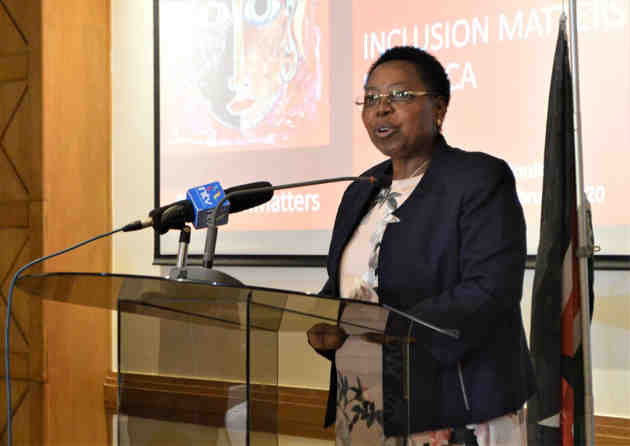STATEMENT DURING CELEBRATIONS TO MARK THE INTERNATIONAL WOMEN’S DAY
The National Gender and Equality Commission (NGEC) joins Kenya and the world at large in commemorating the 2022 International Women’s Day (IWD). This is an annual event held on 8th March every year to celebrate the contributions of women and girls in various spheres of life. The theme for this year is “Gender equality today for a sustainable tomorrow.” The theme takes cognizance of the contributions of women and girls across the globe in climate change adaptation, mitigation and response to disasters for a sustainable future for everyone. This theme is aligned with the priority theme for the upcoming 66th Commission on the Status of Women (CSW 66) which is, “Achieving gender equality and the empowerment of all women and girls in the context of climate change, environmental and disaster risk reduction policies and programmes”
Climate change is one of the greatest threats to sustainable development in the world today. It has adverse effects on agriculture and food security; biodiversity and ecosystems; water resources; health; human settlements and migration patterns; energy, transport, and industry, among other sectors. The World Bank estimates that ‘climate change if unchecked is likely to push 132 million people into poverty over the next 10 years[1].
Women and other vulnerable groups often bear the brunt of the effects of climate change. Studies have shown that climate change impacts differently on women and men, boys and girls with a higher proportion of negative effects borne by women and girls. This is mainly due to differential power levels, the intersectionality of reproductive and productive roles and responsibilities in the community, and less recognition of women’s potential to reduce risks of climate change. Women are more likely to depend, for their livelihood, on natural resources. In Kenya, women account for approximately 75 percent of the agricultural labour force in small-scale agriculture as compared to 51 percent of men[2][3].
Despite these challenges, women and girls have a strong body of knowledge and expertise useful in climate change management. To mention a few examples in water and agriculture, women preserve drought resistance seeds and manage post-harvest food loss, practice inter-cropping to promote soil fertility, are involved in animal breeding, and conserve water catchment areas and forests. In waste management, women and girls are more involved in e-waste scavenging and crude recycling activities compared to men. It is, therefore, necessary to ensure women and girls have access to resources, information, technical skills, and are involved in decision making on climate change policies, strategies and actions. More importantly, duty bearers should invest in understanding key factors driving inequalities and vulnerability of women and girls with a focus on climate change matters.
As we commemorate this years International Womens Day, we wish to laud the government because since 2015 when the global community adopted the Paris Agreement on climate change[4], Kenya has made significant progress in presenting women and girls with opportunities to sustainably deal with the effects of climate change. In 2016, Kenya enacted the Climate Change law, which among others requires the national and county governments to mainstream gender equity in all aspects of climate change responses. In 2018, Kenya formulated a gender-responsive National Climate Change Action Plan, 2018-2022. By end of 2020, and as per the deadline set by the United Nations Framework Convention on Climate Change (UNFCC), Kenya submitted its National Determined Contributions[5](NDC). The NDCs have been translated into actionable plans at the county level and today some counties have established gender-responsive County Climate Change Funds (CCCF). Kenya is also a signatory to the Sustainable Development Goals and obligations. Goals 13 and 15 have a specific focus on climate change indicators and targets.
Following the 2021 Global Annual Conference of Parties on climate change held in the United Kingdom, Kenya held a Devolution Conference in November 2021 under the theme, ‘Multi-level governance for climate action on climate change’. During this conference, county governments committed to designing and implementing climate change policies and strategies that place women, girls and other vulnerable groups at the centre of formulating solutions to climate change. We urge the counties to proceed and actualize these commitments.
In line with our mandate, the National Gender and Equality Commission shall monitor the fulfilment of the commitments made during the 2021 Devolution Conference with a focus on gender equality and climate change. More broadly, NGEC shall continue to monitor the compliance of the State with all laws and policies relating to gender equality and climate change.
In line with the campaign theme of the Intenational Womens Day , which is, “Break The Bias”, we urge all people in Kenya to endevour to beak any bias against women especially during this electioneering period. We should note that bias wether deliberate or unconscious makes it difficult for women to get access and progress in all sectors . As a Commission charged with the responsibility of ensuring gender equality and inclusion of especially the Special Interest Groups (SIGs) who include: women, children, Persons with Disabilities, older members of society, minority and marginalized groups in development, we shall continue to advocate for the full inclusion of women and other SIGs in climate change decisions, programs and actions for sustainable tomorrow.
Happy International Women’s Day!
SIGNED
Thank You.
Dr. Joyce M. Mutinda,PhD, EBS
Chairperson


Comments